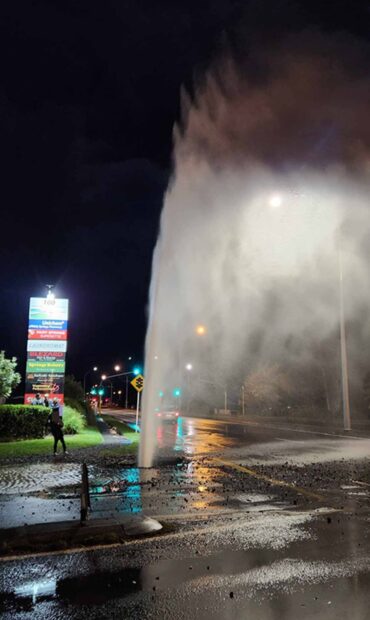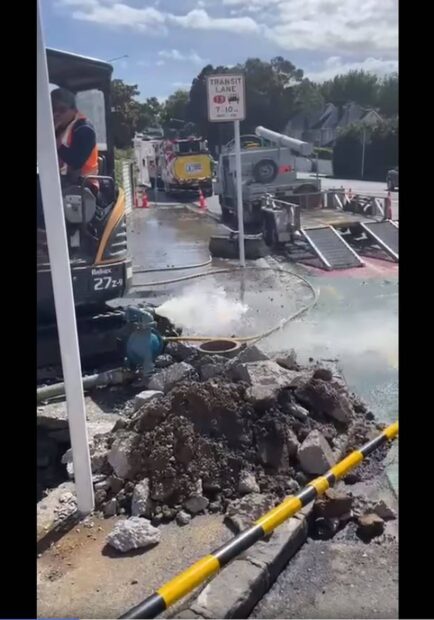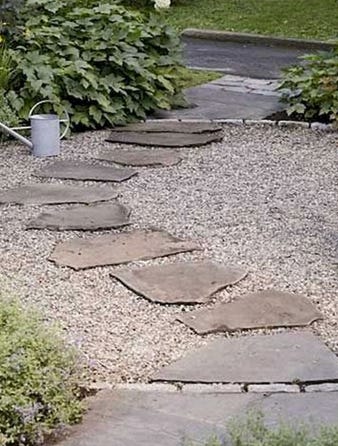 Tui: National Party’s Local Water Done Well – A more expensive 3 Waters with potential for privatisation
Tui: National Party’s Local Water Done Well – A more expensive 3 Waters with potential for privatisation
Written By:
- Date published:
6:30 am, July 18th, 2024 - 4 comments
Categories: Christopher Luxon, jacinda ardern, Privatisation, simeon brown, water -
Tags: 3 waters, Local Water Done Well, Rate increases, tories
Excerpt cross posted from Mountain Tui‘s substack post.
Introduction
In 2022, then Labour Party Prime Minister Jacinda Adern expended significant political capital to protect New Zealand’s water assets from privatisation. She lost that battle, and Labour and the Greens had egg on their faces. At the time, Christopher Luxon said Adern was just pulling a political stunt.
When I read up about it, it did strike me as a rather desperate action by a party that seemed to know more than we did.
Fast forward to now – 2024.
National’s 3 Waters program “Local Water Done Well” has taken off in Auckland. How did it go, and does it pave a pathway for opening up New Zealand to the privatisation of water assets?
But first, how’d we get here?
When the Coalition Government won, one of the first things they did – and to be fair, they campaigned clearly on it – was to repeal Labour’s relatively unpopular 3 Waters program.
Labour’s “Affordable Care” spent years picking up a draft of intent from National, who launched the 3 Waters review in 2017.
New Zealand had been pressed into it by the 2017 Royal Commission into Kiwi deaths, disablement, and poisoning from water. That had found systematic issues with New Zealand’s water infrastructure management, and said we were at critical risk of becoming a third world country if we didn’t address root causes.
Local council control had by all accounts failed us.
And, as National noted back then, a lack of central oversight caused many problems, resulting in a lack of transparency, poor decision making, and an inability for the country to forsee sudden and gradual deteriorations of water assets.
Exhibits –




Labour bemoaned,
“67 different councils own, manage, and operate most of New Zealand’s three waters services. The majority .. don’t have the revenue required to meet the full costs of running these services and assets. Without this, household water costs are projected to rise by up to $9,000 per year by 2051, and we’ll keep seeing burst pipes, contaminated water and environmental degradation.
Our plan will not only mean safer, more affordable water – it will also create… up to 9,000 jobs.. over the next 30 years – with a boost to our economy of up to $23 billion.”
Labour’s 3 Waters got caught up in all sorts of ugly dog-whistling, “ACT in drag” & National Party “arms length ally” Taxpayers Union came out to spread a load of baloney, National promised water rates would NOT increase compared to the status quo, and started an ugly lie that Labour was committing “state-sanctioned theft” – and down it all went.
Enter this man – Simeon Brown.

Simeon promised that his “Local Water Done Well” New 3 Waters would be delivered by mid 2025. He promised it would be cheaper. He set up an advisory group, headed by a flashy consultant who had helped them oppose Labour.
Global credit rating agency S&P did not mince its words though.
November 2023, it said:
- The repeal of Affordable Water Reform legislation will be politically popular but financially detrimental for many New Zealand local councils.
- Our net outlook bias on 25 rated councils is negative and downgrade pressure is building.
What’s happened so far?
Councils in the West Coast and Far North have signaled strong affordability concerns, and in December, Newsroom reported that repealing Labour’s 3 Waters would force councils to hike rates by a third.
We’re already seeing rates rise around the country while National design their model. But we were able to see a glimpse of it in action in Auckland earlier this year.
Now I don’t know who else needs to be told, but 3 Waters debt in New Zealand is astronomical. John Campbell called it a “ticking time bomb.”
The infrastructure debt is almost half of NZ’s GDP.
This is why debt really matters, and credit ratings are key to sustainably fixing this issue.
In 2017, S&P had elevated Auckland’s Watercare credit rating to AA from AA-.
“We understand that the Council has no plans to privatise or reduce its ownership in Watercare in the coming years. We consider that Watercare functions as an arm of the council.”
In May 2024, The Standard reported:
“The credit rating for the 3 Water (Labour) Northland/Auckland 3 Waters entity would have likely been raised from AA to AA+”
What set all this analysis off?
In February, Watercare signalled a ~26% water rate increase for Aucklanders due to the repeal of Labour’s 3 Waters. The plus ~16 -17% increase from original projection was due to a need to “run our business while sticking to Auckland Council’s borrowing limit”.
3 Waters (Labour) would have separated Watercare’s balance sheet from Auckland Council, allowing it to borrow more and keep at or exceed projections. In lieu of that, well this was the result.
Now this type of news could lead the public to cotton on to the fact that Labour’s model would have costed less.
National couldn’t have that happen after they spent years attacking Labour for high water rates, and promising their solution would be cheaper and better.
Simeon Brown and Auckland Mayor Wayne Brown took decisive action. Wayne Brown is facing a forthcoming Mayoral election and Brown Junior does not want to offend one of National’s most valued electorates. Never mind others facing the same problems like the Far North or the West Coast – they just aren’t as important electorally.
In Auckland, Watercare’s situation was promptly ‘resolved’.
May 2024: the Browns announced Auckland council would retain ownership and control over Watercare, but Watercare’s borrowing would be considered separate. In effect, they were divorcing financially.
And through legislative changes, National will make sure that under no circumstances, would Auckland council ever be able to assist Watercare if it ran into financial difficulties. That means their assets would go to debtors if anything ever went awry.
More on that later, but pic for placement.

Another of the significant consequences of this is higher debt ratings for Watercare.
S&P:
“An entity such as Watercare can’t borrow on terms as competitive as the council can unless it’s part of the council or at least backstopped by the council.”
Labour’s McNulty:
“The Auckland/Northland entity would’ve had a credit rating of AA, while Watercare will be BBB at best, so the cost of borrowing will be larger”.
Watercare claimed it was too early to tell. Maybe they could have asked everyone else.
And this is the best case, as Watercare is our country’s largest watercare entity. Other regions are unlikely to be so lucky.
And at those debt levels, the interest differential is going to be tremendous.
Wait, wait, what happened?
Essentially, all National did was move the money off (i.e divorce) Watercare’s financials from Council books and lump all the debt onto Watercare as a financially independent entity.
Watercare then borrowed – at a higher rate – for a longer period, thus allowing the local and national government to take a short term headline win.

As any of us who have been following this Coalition government know by now, they seem most focused on optics and perception.
For them, the headline win was echoed by Simeon Brown, who crowed,
“Some said that Local Water Done Well could not be done.But within the space of just six months, the coalition government has worked with Auckland Council on designing a new model for Watercare.”
That’s not a model, Simeon. That’s called loading more costs onto Auckland taxpayers under cover of darkness while pretending you’re giving them a lolly.
You’ve also cut our water entities off from local or central government support.
Brown and Brown announced giddily that rates would be kept low at a 7.2% water rates increase (by hiding the costs with a longer term)
It’s simple, stupid.
Right?
Any other bad news?
The real water infrastructure problems are obviously hugely complex, systemic and will require significant resources and expertise. There could be many hidden risks yet to be uncovered. The $186bn estimate as it now stands could be higher. Water infrastructure management is not a common skillset either.
What this new National 3 Waters arrangement does though is immediately create separation and accountability from the likes of Luxon, Brown and Brown if rates rise or infrastructure problems become difficult to manage.
i.e. It creates distance and therefore plausible deniability.
It’s smart politics.
If the stuff hits the fan, which it will at some point, you can bet who will be ‘accountable for that.’
Another advantage of National’s 3 Waters, for National, is it ticks off those attack lines –
‘We will allow councils to retain control. We will separate balance sheets so the new entities can borrow (shh…at a higher relative debt level).’ etc.
Hopefully, National addresses the root cause issues identified in the original 2017 National Party Cabinet memo that noted that without addressing a lack of central oversight, we could be risking Kiwi lives, emergency service needs, and “lifeline infrastructure.”
What are the disadvantages?
The obvious ones are it’s an entity separation with telling implications:
- Higher debt, risk of us losing our water infrastructure to multinationals, and a whole heap of money, time and resources wasted on optics politics while Rome burns..
Wait, what – privatise water assets?

The National 3 Waters model appears as a pipeline possibility now for privatisation.
In the quote above, Noam Chomsky was referring to Margaret Thatcher’s ploy for privatisation in the UK. Thatcher started the penchant for Tory privatisation. This is one company she privatised – Thames Water.
There are a lot of headlines around Thames Water in the last years – mainly it’s heavily in debt, keeps wanting to charge ‘customers’ exorbitant fees, leaking sewerage, unable to upgrade facilities and may drop any time – so much so the UK has considered re-nationalising it.

It might be of interest to note Thatcher was advised by the founder of the Atlas Network, Antony Fisher.
Today that network encompasses most right and far right wing think tanks like New Zealand Initiative (where Nicola Willis came from), Taxpayers Union (where Casey Costello came from), and the Heritage Foundation.
The latter has written out how the next Trump presidency will play out. (Hint: Don’t read it if you want to sleep soundly at night) I’m sure it’s a great club to belong to where ideas are exchanged freely.
Now, could this Coalition government, which already wants to privatise roads, ferries, defence infrastructure, police stations, schools, want to privatise water assets too?
No –
It couldn’t be.
Multinational private companies have noticed a shift too, with corporate water company Veolia already publicly vying for business to our government last month.
As I outlined in my posts about Interislander and Kainga Ora, this Government knows how to lay the stepping stones out to a desired course of privatisation.

I’m afraid this is no different.
Happy to be proven wrong.
Mountain Tui
4 comments on “Tui: National Party’s Local Water Done Well – A more expensive 3 Waters with potential for privatisation ”
- Comments are now closed
- Comments are now closed
 ”? Emojis can have more legal weight ...
”? Emojis can have more legal weight ...
Mountain Tui, you have yet again got to the crux of it. That Noam Chomsky quote so apt. And all those Atlas connections !…..When dirty politico Jordan Williams is telling us ..No, nothing to see here ; we who are aware see clearly through… to the reality.
As : Look over there ..at those Maoris ! (incl the quite disgustingly shameful way they used Garrick Tremains racist cartoons against Nanaia Mahuta : (
Meanwhile, the privatisation profit plans were being prepared.
Mountain Tui, Keep up your excellent work !
Bravo!!
What more can one say-an excellent piece.
Shades of Muldoon cancelling Labours Superannuation Scheme back in 1975. The effect was greater costs long term. Just like cancelling 3Waters.
What can the People do about it?
Stop voting for these economic vandals.